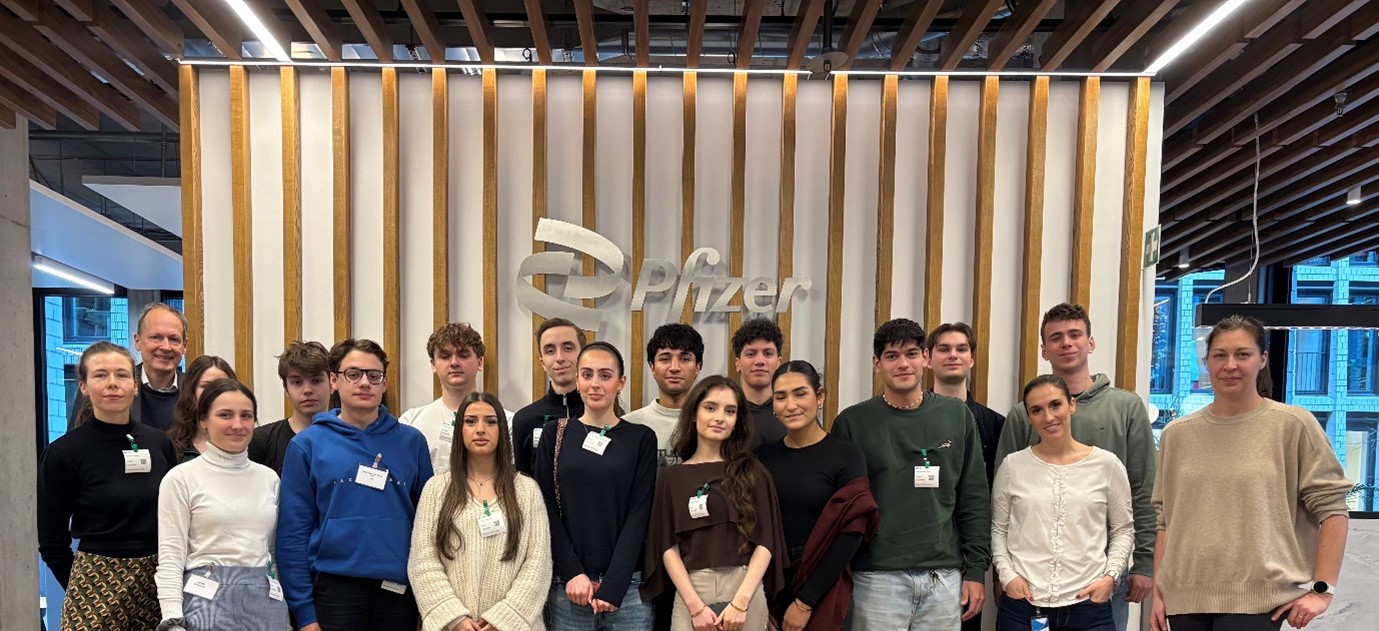
TU Berlin Visits the Pfizer Healthcare Hub Berlin
The Pfizer Healthcare Hub Berlin recently welcomed students from TU Berlin at Pfizer’s German headquarters. The visit aimed to provide the students with insights into the pharmaceutical industry, with a particular focus on digitalization and innovation processes. This resulted in a lively exchange on strategic innovation in healthcare.
Torsten Mintel, Director Strategic Innovation, introduced Pfizer and provided an overview of key figures and the company’s innovation priorities. He highlighted the strategic importance of innovation for Pfizer and, using current projects as examples, illustrated what strategic innovation means in practice and which objectives Pfizer pursues. The presented approaches were subsequently discussed in an open and interactive exchange.
A particular highlight was a virtual tour of Pfizer’s production site in Freiburg, which is regarded as a pioneer in lean manufacturing as well as environmental protection and sustainability.
Practice‑Oriented Case Studies on Technological Trends and AI
To deepen their understanding, the aspiring healthcare managers were asked to work on the following case studies:
- Which technological trends will become relevant for Pfizer in the future?
- What added value, opportunities, and risks does AI create for patients, healthcare professionals, and Pfizer?
Learning from each other across academia and industry
The exchange proved valuable for both sides: the students gained practical insights into the innovation processes of a pharmaceutical company, while the Pfizer Healthcare Hub team was inspired by the fresh perspectives and ideas of the next generation of healthcare professionals.
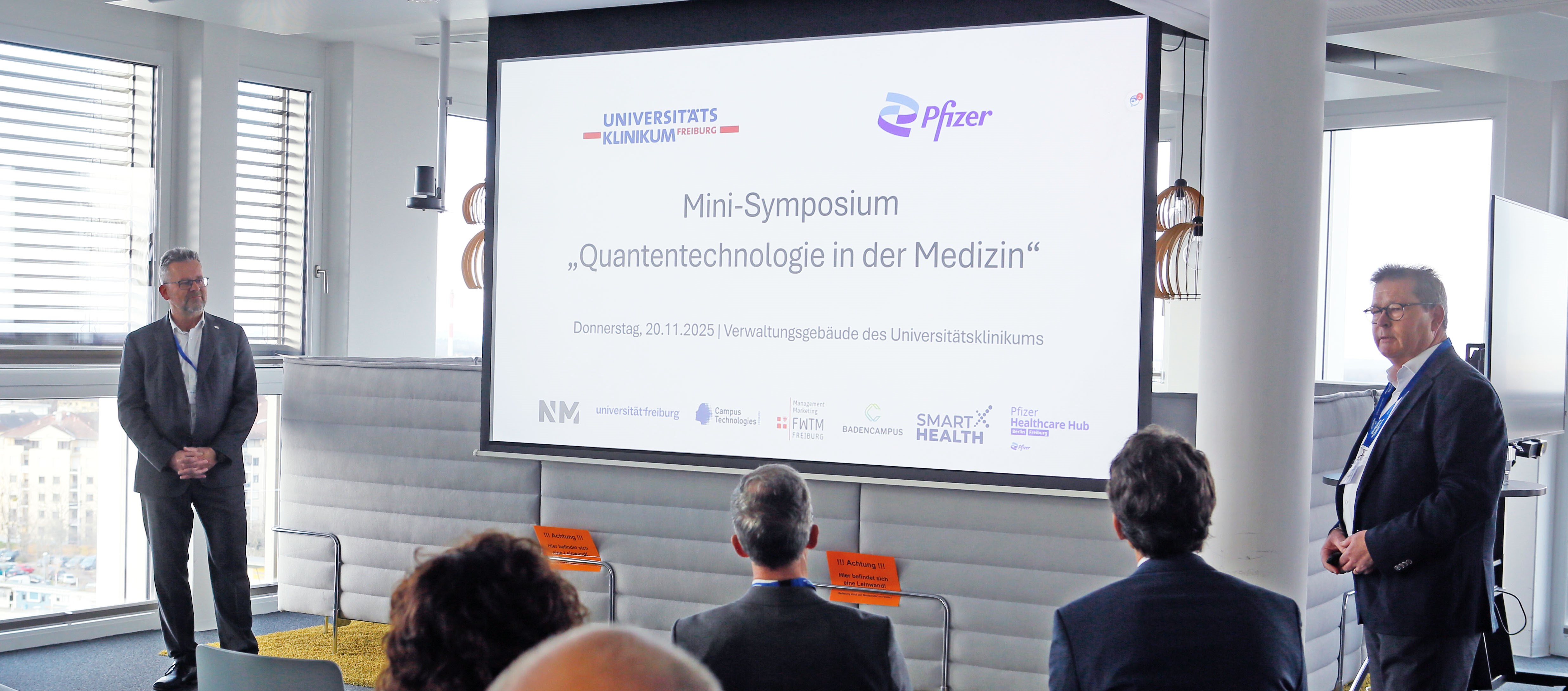
Mini-symposium “Quantum technology in medicine”: Strategic partnerships driving the future of healthcare
As part of a mini-symposium on “Quantum technology in medicine,” hosted by University Medical Center Freiburg and Pfizer Germany, key players from science, industry, and the innovation ecosystem came together last week. The symposium clearly demonstrated that successfully implementing quantum technologies to address medical challenges requires interdisciplinary collaboration between research, industry, and clinical practice.
New milestone in collaboration: University Medical Center Freiburg and Pfizer co-host symposium on quantum technology in medicine
AI and quantum computing are strategic key technologies with the potential to fundamentally transform precision medicine, prevention, and pharmaceutical value creation. The goal of the mini-symposium was to build a shared understanding of how quantum technology can be applied in medicine and to identify concrete touchpoints for research and clinical practice.
Quantum technology and AI as key drivers of the next wave of medical innovation
Following a welcome by the organizers Jochen Burkhardt, Head of Strategy and Development at University Medical Center Freiburg (UMCF), Hiroyo Iida-Falk, Innovation Project Manager at UMCF, and Peter Neske, Innovation Lead and Head of the Pfizer Healthcare Hub Freiburg, the symposium was opened by Prof. Dr. Dr. h.c. Frederik Wenz, Chief Medical Director and CEO of UMCF, and Dr. Christian Lenz, Medical Director and member of the Executive Board at Pfizer Germany, with their respective keynotes.
Prof. Wenz emphasized the role of research in accelerating the transfer of innovation into clinical practice. UMCF focuses on interdisciplinary collaboration, international networking, and integrating industry partners. Prevention is central to stabilizing the healthcare system, while future technologies such as AI and quantum computing are seen as drivers of progress in diagnostics, drug development, and imaging.
Dr. Lenz highlighted the importance of quantum computing for pharmaceutical research. Combined with AI, it could reduce drug development timelines from ten years to just a few. Despite its enormous potential, challenges such as scalability and cost remain.
Round 1: Insights from fundamental research
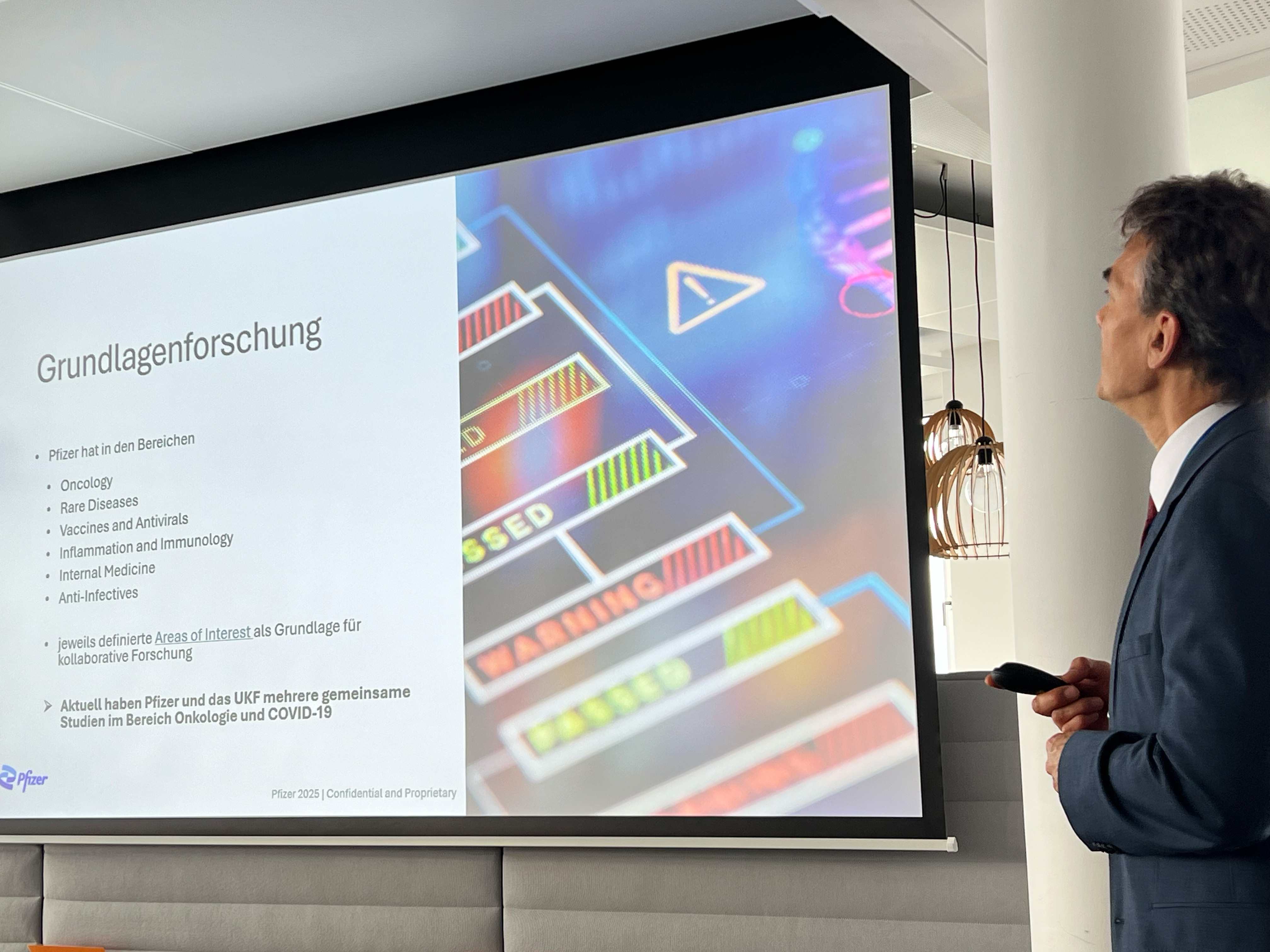
Quantum computing is a game changer for the future of medicine, but current limitations remain.
Quantum technology offers tremendous opportunities for processing high-dimensional data, creating digital twins, and developing personalized therapies. However, technical hurdles such as error-corrected qubits and hardware bottlenecks remain, meaning realistic applications are not expected before 2030.
To fully leverage this technology, synergies between AI, quantum computing, and strategic partnerships are essential.
Pfizer and other stakeholders are investing in AI, digital twins, and cloud solutions to accelerate complex molecular interaction calculations. Start-ups are driving algorithm development, while large companies are bridging the gap to widespread quantum adoption through collaborations and supercomputing.
Round 2: Insights into applied quantum computing

Quantum computing and digital technologies are key drivers for personalized prevention and data integration.
In the future, quantum computing, AI, and interoperable platforms such as OPTIMA will enable the analysis of vast medical data spaces and the development of precise prevention strategies. This requires structured data as well as clear ethical and technical standards.
Innovation demands cultural change and regulation.
Openness, acceptance of failure, and global rules for the use of AI and quantum computing are essential to harness opportunities such as digital twins and smart health projects while minimizing risks like data privacy breaches or loss of autonomy.
Round 3: Insights for applications in diagnostics and pharmaceutical production
Pfizer’s first quantum computing projects show promising results.
Pfizer is leveraging AI and quantum-based methods in multiple ways. A pilot project optimizing production planning at the Freiburg site demonstrates practical applicability. In the future, these technologies are expected to contribute to early detection of oncological diseases—aligned with national and European high-tech strategies.
Quantum sensing sets new standards in oncology.
Together with University Medical Center Freiburg, Pfizer is developing quantum-based methods for highly sensitive antigen measurement. The combination of NV-diamond sensing, magnetically labeled antibodies, and AI-driven data optimization aims to revolutionize personalized therapy decisions. Initial results confirm the potential for companion diagnostics and liquid biopsy.
Summary and outlook: “Taking risks could become Germany’s greatest resource.”
In the wrap-up, Prof. Wenz emphasized the importance of interdisciplinary collaboration between clinics, research, and industry to successfully address complex topics such as AI and sensing technologies. The University Medical Center contributes questions, biomaterials, and data. In addition to study data, real-world and prevention data should also be leveraged. From 2026, new legal frameworks will enable expanded use of patient data – a major achievement that requires responsible action, Prof. Wenz noted.
Dr. Lenz underlined the relevance of clinical data for Pfizer and proposed continuing the format. The organizers highlighted the strength of the regional innovation ecosystem stretching from Mannheim/Heidelberg through Karlsruhe and Strasbourg to Basel, including numerous active collaborations, such as via the innovation platform.
“Taking risks could become Germany’s most important resource,” quoted Peter Neske, urging participants to harness the momentum for future joint projects.
The organizers concluded that this symposium should serve as a starting point for further formats to advance the use of quantum technology in diagnostics and therapy.
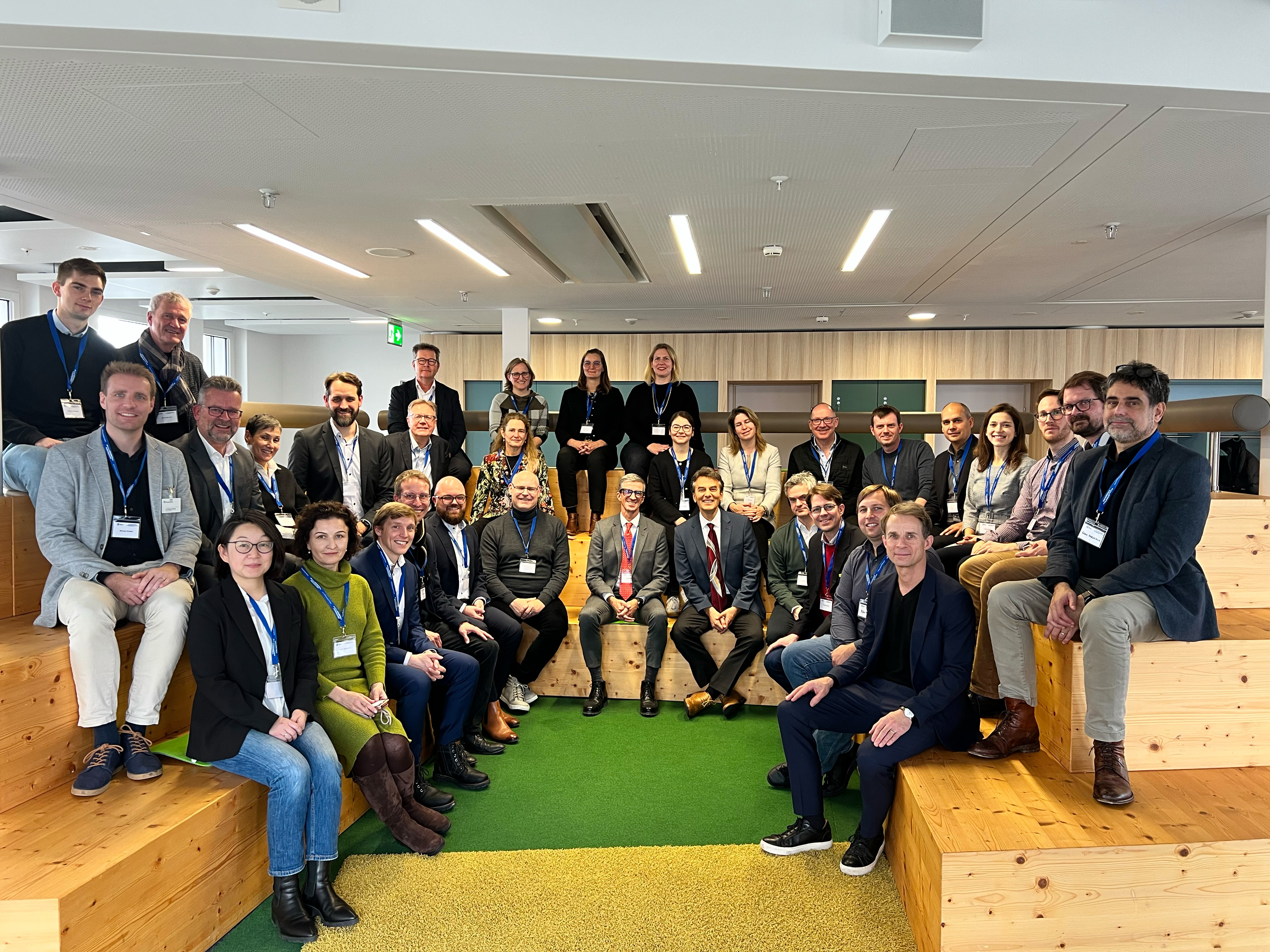
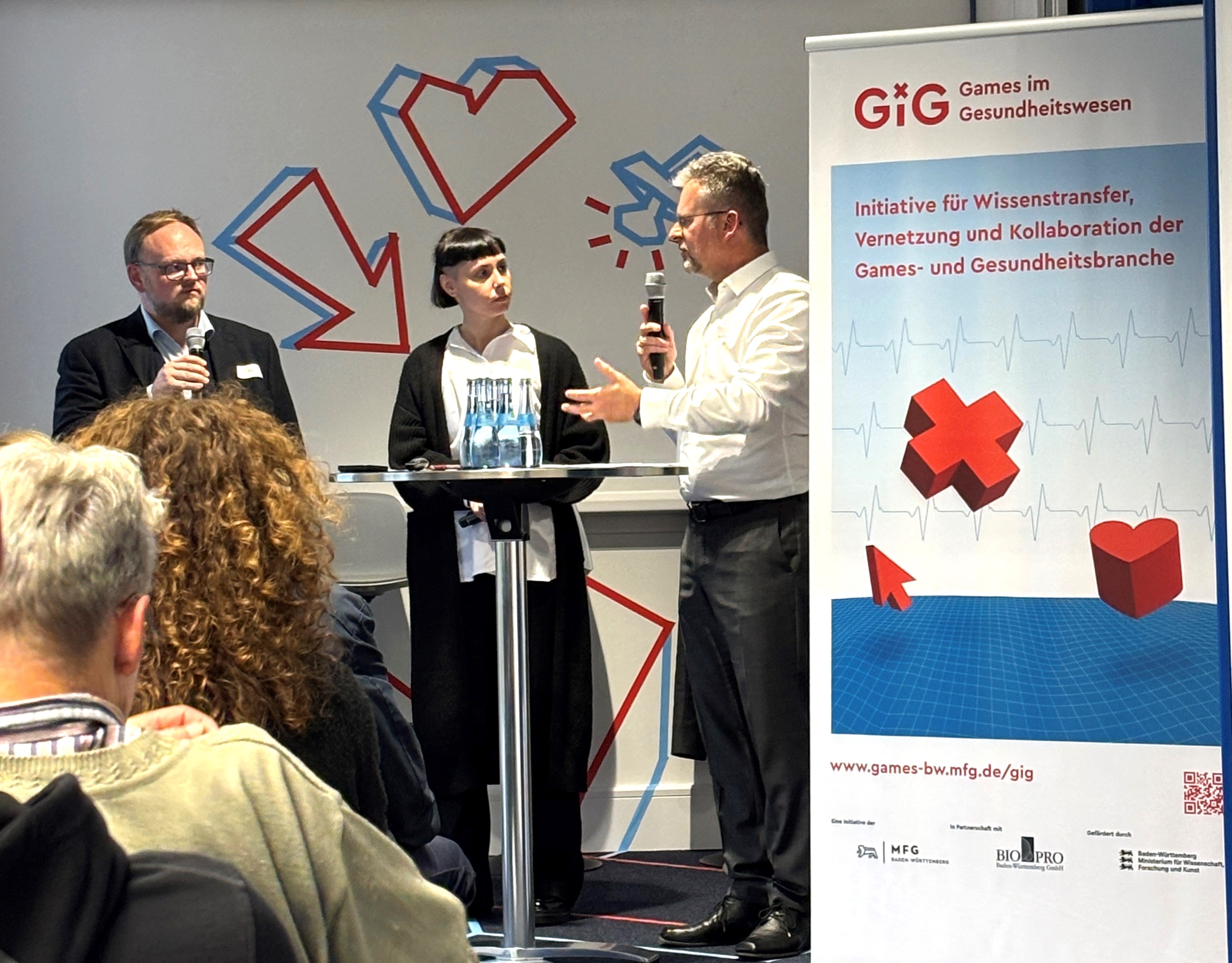
Bet I can do it? The potential of gamification in health prevention
How gamifiable are digital health solutions? That was the topic of discussion between Peter Neske and Kyra E. Lukas, moderated by Christoph Brosius, during the GiG xTalks. Conclusion: Gamified approaches offer strong impulses and promising perspectives for health promotion and prevention.
About the GiG xTalks
How can digital health solutions be designed using playful approaches? The GiG xTalks are hosted by MFG | Medien- und Filmgesellschaft Baden-Württemberg and are part of the GiG – Games & Gamification in Healthcare initiative. The event series explores both early-stage ideas and projects that have already introduced gamified solutions to the healthcare market.
How can the drive for progress and goal achievement be leveraged in health prevention?
Kyra E. Lukas and Peter Neske discussed this question using real-world examples, highlighting how games and gamified applications can foster motivation. They also examined implementation and impact from a healthcare industry perspective.
Use cases presented:
- BARMER bonus system: Used to strengthen customer loyalty through gamified incentives.
- Biocircuit: An AI-powered circuit training system that uses digital rewards to visualize progress and boost motivation.
- HUMANOO health app: Encourages user ambition through leaderboards and financial incentives.
- Six to Start: Game developers who engage younger audiences with smartphone-based fitness games.
Kyra E. Lukas, co-founder of Trapped Predator, an indie game studio and media startup based in Ludwigsburg, spoke about the largely untapped potential of playful approaches as motivational tools in preventive health applications.
Peter Neske, Innovation Lead at the Pfizer Healthcare Hub Freiburg, shared insights from the healthcare industry. He showcased how Pfizer is already applying gamified strategies, for example in personalized therapy support programs and smoking cessation apps.
More on this: Pfizer and Alex Therapeutics join forces on smoking‑cessation app for the German market
Conclusion: Games hold significant potential in the field of health prevention.
However, gamified approaches in regulated environments like healthcare must meet high standards in usability, data security, and privacy. The GiG xTalks offered an inspiring look into the diverse possibilities of games in health prevention and demonstrated that Baden-Württemberg is well-positioned with initiatives and networks such as MFG, BIOPRO Baden-Württemberg GmbH, and LinkHealth@BW.